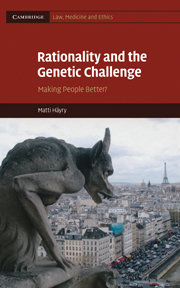Book contents
- Frontmatter
- Contents
- Preface
- 1 Seven ways of making people better
- 2 Rational approaches to the genetic challenge
- 3 The best babies and parental responsibility
- 4 Deaf embryos, morality, and the law
- 5 Saviour siblings and treating people as a means
- 6 Reproductive cloning and designing human beings
- 7 Embryonic stem cells, vulnerability, and sanctity
- 8 Gene therapies, hopes, and fears
- 9 Considerable life extension and the meaning of life
- 10 Taking the genetic challenge rationally
- Bibliography
- Index
7 - Embryonic stem cells, vulnerability, and sanctity
Published online by Cambridge University Press: 05 July 2014
- Frontmatter
- Contents
- Preface
- 1 Seven ways of making people better
- 2 Rational approaches to the genetic challenge
- 3 The best babies and parental responsibility
- 4 Deaf embryos, morality, and the law
- 5 Saviour siblings and treating people as a means
- 6 Reproductive cloning and designing human beings
- 7 Embryonic stem cells, vulnerability, and sanctity
- 8 Gene therapies, hopes, and fears
- 9 Considerable life extension and the meaning of life
- 10 Taking the genetic challenge rationally
- Bibliography
- Index
Summary
In this chapter, I examine two aspects of the morality of human embryonic stem cell research. The first is the role of women in the acquisition of eggs for embryo creation. The second is the moral status of embryos that perish in destructive modes of stem cell research.
What, why, and how regulated?
The possibility of research on human embryos and embryonic stem cells shifts the focus of discussion drastically from making better people (creating new individuals) towards making people better (improving the health of existing individuals). Embryos and their early parts are, if implanted and nurtured properly, capable of developing into adult human beings, but this development is disallowed in most forms of embryo experimentation. The aim of the practice is not reproduction but rather the accumulation of biological and medical knowledge for the benefit of the population.
Embryonic stem cells can be acquired from embryos produced by in vitro fertilisation (IVF), somatic cell nuclear transfer (the Dolly method), or duplication. Although embryos created by IVF for fertility treatments but left unused can provide good materials for research, future stem cell treatments would ideally also seem to require cloning by nuclear transfer. Donor stem cells can be rejected by the recipient’s immune system, but this could be prevented by creating an embryonic clone of the patient and harvesting this for therapeutic and immunologically compatible stem cells. The difference between ‘therapeutic’ and ‘reproductive’ cloning would then be that in one the embryo is destroyed to provide a cure and in the other it is implanted to make a baby.
- Type
- Chapter
- Information
- Rationality and the Genetic ChallengeMaking People Better?, pp. 146 - 173Publisher: Cambridge University PressPrint publication year: 2010



